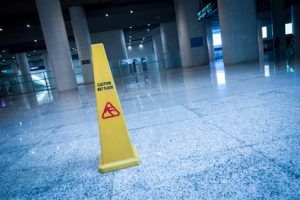
The Evidence
You need evidence that the store owner or other responsible party purposely or negligently left the area wet. Typically, it is due to negligence on the part of the employees as well as the owner. Someone spills something at the grocery store and the clerks clean it up. They work in such a hurry that they forget to put out the Wet Floor sign, which is right when you walk by, slip on the floor and get injured. What you need is proof that the owner/manager knew of the wet spot and did not make sure that it was properly signed. The evidence can be found in store logs that employees keep for routine and spontaneous cleaning, by talking to other store employees about the incident, talking to witnesses, and evaluating the circumstances including the amount of lighting in the area and the precautions that were taken to alert patrons of the slippery area.
You will have to be able to prove that you could not prevent the fall from happening. This might seem obnoxious to you since you know the floor was wet and was the reason you fell, but the jury will want to know that you had no idea of the condition of the floor or the risks that it posed. For example, if you overlooked a sign that might not have been directly on the slippery area, but a short distance away, you might not be able to claim negligence on the part of the owner. Every aspect of the circumstances will need to be evaluated in order to determine what you are able to get from the injuries.
If you are a victim of a slip and fall accident in a retail store, the best thing you can do is consult with a qualified attorney. A civil suit might be able to be brought against the store if probable cause is found; let the experts help you decide if it is present or not!

